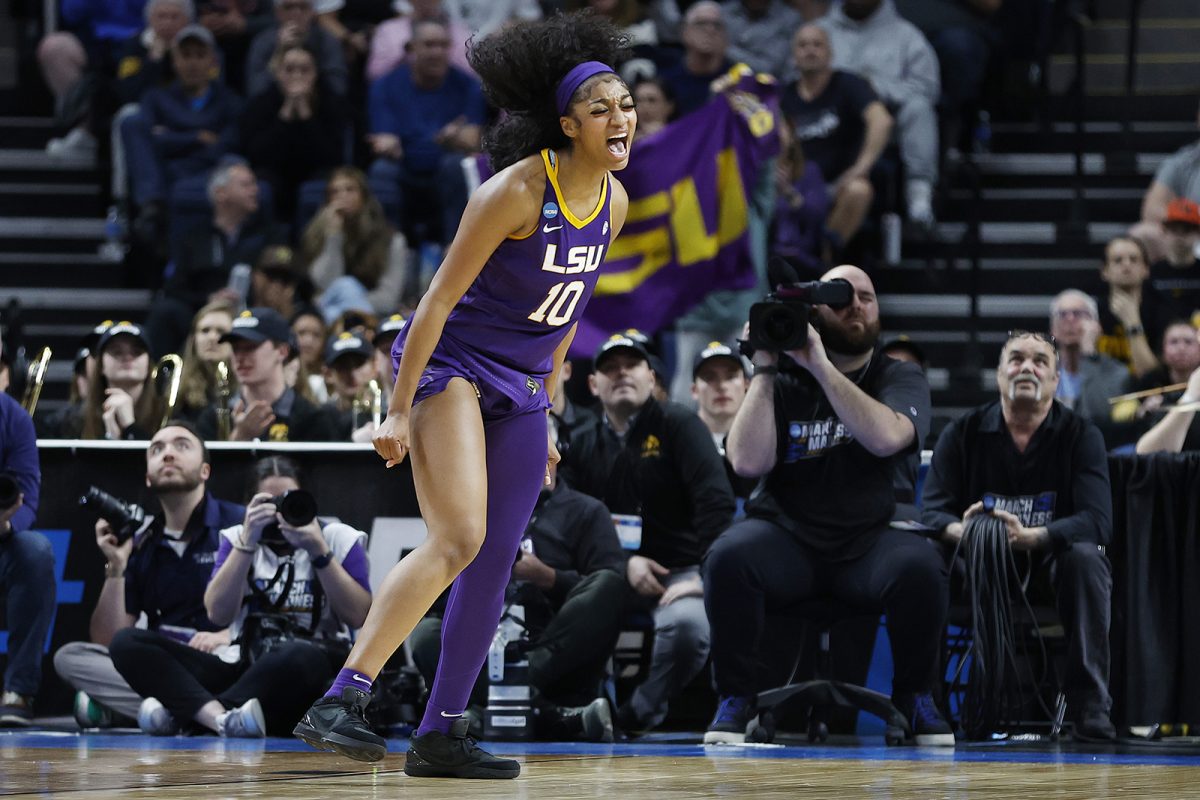The 2023-24 women’s college basketball season was the most exciting in recent memory for basketball fans. With players such as the University of Iowa guard Caitlin Clark having her fame skyrocket to becoming a household name, it is a rare instance for a women’s collegiate sport to be more popular than its male counterparts.
However, while the newfound popularity is breaking barriers for all women’s sports, more attention does not mean it’s all positive. This is especially true for Louisiana State University’s star forward Angel Reese, who has quickly become one of the most polarizing and scrutinized athletes in the country.
Reese exploded into the mainstream after her 2022-23 campaign, in which she was named to the All-SEC first team, AP All-American first team and won a national championship for the Tigers.
However, all her accomplishments would seemingly be overshadowed when videos of Reese seeking out Clark towards the end of the 2023 championship game to point at her ring finger went viral. The incident sparked mass discussions about sportsmanship and “classlessness,” before it eventually developed into a mess of racism and double standards.
The internet seemed divided on the incident, with initial reactions varying from angry rants about how Reese was classless to praising her competitive nature.
Most professional and collegiate athletes defended Reese, crediting her confidence seconds away from winning a national championship. In fact, Clark has stated on multiple occasions that she’s OK with what Reese did, and even verified before their recent matchup that the pair don’t hate each other.
Despite most of those who would be considered “qualified” to give an opinion siding with Reese, and those who “should” be upset with her personally not holding any contempt, so why is she receiving all the hate?
The main reason is that she is undeniably a standout from her counterparts in the sense that she plays great on the court and unapologetically speaks her mind. Whether this comes in the form of a postgame rant or letting an opposing player know she can’t guard her, Reese is not one to back down in any sense.
This trait is extremely commendable amongst male basketball players, with superstars such as Larry Bird and Kobe Bryant building entire legacies on unwavering self-confidence and their willingness to let their fellow opponents know.
Despite this, social media users and media sources alike have painted Reese as a villain, even though her actions do not warrant the role she’s being slotted into.
But, if Reese isn’t the villain, then who is?
Nobody is. Yet she is certainly being treated as one.
In case you’re wondering, no, disliking Reese for her actions on the court or her words off of it doesn’t make you a racist or sexist. If you have issues with how Reese presents herself as an athlete, that’s valid. Everyone is entitled to their personal opinion on how athletes conduct themselves. However, an opinion needs to be consistent with all players and their actions.
Now, while your opinion is not inherently racist, the discourse around Reese has undeniably produced heavily biased undertones coming from the public and media alike. You may unknowingly be a hypocrite after falling victim to how she’s being portrayed.
The main form of this unfair discourse comes in the form of double standards when discussing Reese’s behavior. While she does perform polarizing stunts such as trash-talking and taunting crowds, it is not an unusual scene in the sports world.
Clark has had multiple instances of “bad sportsmanship” this season that are on par with Reese’s behavior, including shouting at a West Virginia crowd to “Shut the fu** up” during a Round of 32 matchup in the NCAA tournament.
The most egregious example of unfair criticism came from an op-ed published in the Los Angeles Times by Ben Bolch titled “UCLA-LSU is America’s Sweethearts vs. its Basketball Villains.”
The original version of the editorial described the Tigers as “dirty debutantes” and compared the two as “Milk and cookies vs. Louisiana hot sauce.” While most of the article fairly critiques LSU Head Coach Kim Mulkey and the consequences of her abrasive personality, the language used in the lede was quickly deemed offensive.
Nevertheless, the now infamous article is just one part of a mass of hate Reese is currently facing in the wake of LSU’s 94-87 loss to Iowa. Having just recently announced her upcoming transition into the WNBA, the spotlight will only grow exponentially.
For those approaching the subject from a neutral perspective, the best thing to do is appreciate what’s in front of you. This goes not only for Reese, but all the current women’s college basketball players who are relentlessly great at their sport.
There are a plethora of current players full of confidence who are willing to let their competitors know, and it has created an aura around a women’s sport that lacked star power.
So for those planning to continue to keep up with college women’s basketball or even possibly make the jump to WNBA viewership, consider what actions are truly “classless” from those that make the sport exciting to watch.






Pabo • Apr 18, 2024 at 2:54 pm
She’s being treated as a villain because she’s black.
Racism is alive and well in America.
Robert • Apr 18, 2024 at 7:52 am
Thanks for sharing.
Let’s play ball.